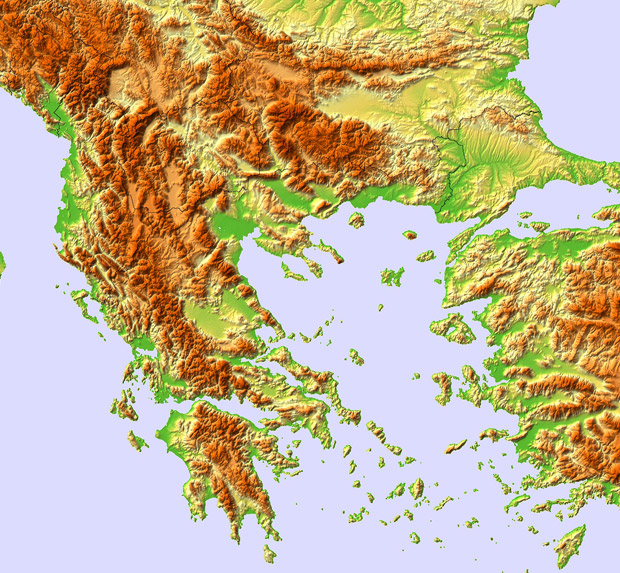- The Brothers Gerazounis: Engineering the Lifeblood of Buildings
- The Hellenic Initiative Summer Youth Academy Empowers Underprivileged Children Through Sports
- CAPTAIN MARIANTHI KASDAGLI: Charting her own course at sea
- Oscar nominee Lorraine Bracco of ‘Goodfellas’ is having ‘More Fun’ than ever before
- Voice And Vision: Grigoris Maninakis, 50 Years Of Greek Music In America
Could Greece become the Linchpin of a Balkan-East Mediterranean Alliance?

Alexander Billinis
Even in asking the question, I feel a wave of doubt and skepticism. The region is dysfunctional and poor, full of failing states and weak institutions. I know the rot of Greece, Bulgaria, and Serbia first hand, from living and working in each of these countries, and the general outlook, both political and economic, is generally bad. Add to this the emergence of Turkey as an aggressive Islamist dictatorship, an imminent economic collapse of Greece, and the potential disintegration of any number of Balkan or Near Eastern states, and the prospects for survival, much less revival, seem rather bleak.
And yet . . . .
Perhaps because of the problems, and in spite of the well known dysfunctions throughout the region, some solutions might be on hand. A convergence of factors may foster and support the emergence of a new defensive alliance system that will benefit Greece and the neighborhood.
The Eastern Mediterranean
For many years, the Israelis and the Turks enjoyed excellent relations, while Greek-Israeli relations were out in the cold. Israel and Turkey had strong economic and political relations, and Israeli pilots even used the vast Turkish airspace for training. Turkey’s secular governments, generally anti-Arab, found common cause with the other non-Arab state in the region. The relationship, however, was uneasy and as Turkey became increasingly Islamist, relations went south.
At the same time, Greece and Israel improved their relations, particularly as Turkey became more aggressive and, perhaps as importantly, as it became clear that there were hydrocarbons under Greek, Cypriot, and Israeli Exclusive Economic Zones (EEZ), claims which were actively challenged by Turkey.
Greek and Israeli tourism and trade relations increased. Greek-Americans and Jewish-Americans began to lobby in tandem on common causes, and the two nations military cooperated. An unofficial alliance was emerging, with the increasing blessing of the United States. This cooperation has tightened in the past year, as Turkey suffered a coup and a referendum which has essentially created an elective dictatorship for Erdogan. Greek, Cypriot and Israeli air forces train together and recently Israeli Special Forces have been training with the Cypriot National Guard.
While not an actual alliance, Greece’s increasing coziness with the most powerful military in the Middle East (with the world’s third best air force) is certainly a complication for Turkey. Further problematic for Turkey is Exxon’s interest in exploiting hydrocarbons in the Greek, Israeli, and Cypriot EEZs. Petropolitics is an American specialty, and the current US Secretary of State, Rex Tillerson, was Exxon’s Chief Executive Officer until his appointment to the Cabinet. Erdogan’s conduct with American bases in Turkey has alienated Washington, and Greece is poised to gain by her willingness to host American bases. In spite of Greece’s economic woes, and the general rot of her political system, she maintains a capable air force and navy, with strong leadership.

The Balkans
Turkish or proxy agitation has impacted the Balkans as well. Turkey has been a constant supporter of Muslim minorities in the Balkans, as well as being Albania’s biggest supporter. Erdogan has threatened the territorial integrity of both Bulgaria and Greece, suggesting that both countries’ eastern frontier areas rightfully belong to Turkey. Turkey has egged on Albanian agitation in southern Serbia, Kosovo, and elsewhere, which poses a direct threat to Serbia. While for Serbia the threat comes not directly from Turkey, Albanians are certainly emboldened by the Turks.
For the past twenty five years, Greece has been actively involved in the rest of the Balkans, economically and politically. Greece is a Balkan country sharing the same culture and religion with most Balkan peoples. Greece has invested heavily in all of the Balkan countries, and actively supported Bulgaria’s accession to NATO and to the EU. The past animosity between Greece and Bulgaria has largely evaporated; the two countries are heavily interdependent with excellent political, trade, and economic relations. Cultural and religious similarity certainly helped to foster this situation and common geography, the source of conflict in the past, is now a key to their cooperation.
It is in fact geography that makes a closer political and military cooperation all the more important between the two countries. Bulgaria shares a land border with Turkey in Thrace. It is far better to stand immediately with Greece in case of conflict than to watch Greece be defeated because then Bulgaria is completely a sitting duck. Better to sign up to a virtual alliance (within the NATO alliance) with Greece than allow for Turkey to peel the Balkans like an artichoke, leaf by leaf. The military cooperation has begun and the two militaries increasingly train together.
While geography to some degree shields Serbia from a direct confrontation with Turkey, Serbia is exposed to Turkish proxies in Albania and Bosnia, so a defeated Greece or Bulgaria exposes Serbia too. Moreover, if the Former Yugoslav Republic of Macedonia (FYROM) implodes, it is not inconceivable that Turkey will try to use its good offices with the Albanians and Slav Macedonians to put boots on the ground. This would put the Turks within easy reach of Kosovo and Bosnia; Serbia would then be the next victim. The line has to be drawn in Thrace and the Aegean, and Serbia and Bulgaria need to stand firm with Greece.
The Turkish threat is not the only reason for the three Balkan countries to cooperate militarily. Turkey does not only have a huge army at its disposal, but also the fate of literally millions of refugees that it could send against the Greek islands, as it has in the past. Here too cooperation between Greece, Serbia, and Bulgaria is vital to deal with this tragic human wave that may yet again come. In addition to refugees fleeing war, poverty, and terror, among the refugees are those who would foster terror within Europe, including Greece, Serbia, and Bulgaria. Military cooperation is vital to mitigate this very real threat. Given that Europe has abdicated its responsibility to help front line states; these states must take matters into their own hands.
This “virtual alliance,” a Balkan and East Mediterranean axis is not offensive but rather a sound policy of containment of Turkey. All of the countries in question are status quo powers interested only in protecting themselves. Given that all face some kind of threat from Turkey, it is natural for these various countries to cooperate; they already are working together on so many levels. Turkey, faced with a “containing coalition,” might learn to play nicer in its neighborhood. Further, the presence of a string of countries determined to defend themselves just might embolden the huge part of the Turkish population that desires pluralism at home and good relations abroad. This Turkey would be welcome in the region and a great partner for all of her neighbors.
The convergence of opportunity, threat, and geography are all there. The major problem, as ever, is the human factor. Greece and Serbia, in particular, are run by profligate populists with precious little competence. Thankfully, there exist technocratic types in all of these countries who are looking out for their countries’ best interests. A regional collective defense will build on other regional cooperation, provide a credible deterrent to Turkey, and, possibly, strengthen pluralistic and democratic forces in the country.











0 comments